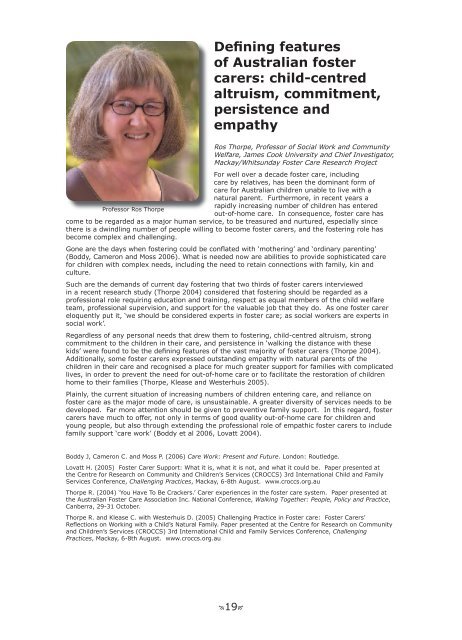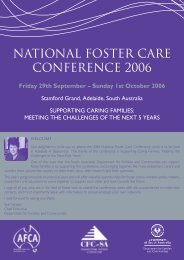Supporting Carers Of Other People's Children - Australian Foster ...
Supporting Carers Of Other People's Children - Australian Foster ...
Supporting Carers Of Other People's Children - Australian Foster ...
- No tags were found...
Create successful ePaper yourself
Turn your PDF publications into a flip-book with our unique Google optimized e-Paper software.
Defining featuresof <strong>Australian</strong> fostercarers: child-centredaltruism, commitment,persistence andempathyRos Thorpe, Professor of Social Work and CommunityWelfare, James Cook University and Chief Investigator,Mackay/Whitsunday <strong>Foster</strong> Care Research ProjectFor well over a decade foster care, includingcare by relatives, has been the dominant form ofcare for <strong>Australian</strong> children unable to live with anatural parent. Furthermore, in recent years arapidly increasing number of children has enteredProfessor Ros Thorpeout-of-home care. In consequence, foster care hascome to be regarded as a major human service, to be treasured and nurtured, especially sincethere is a dwindling number of people willing to become foster carers, and the fostering role hasbecome complex and challenging.Gone are the days when fostering could be conflated with ‘mothering’ and ‘ordinary parenting’(Boddy, Cameron and Moss 2006). What is needed now are abilities to provide sophisticated carefor children with complex needs, including the need to retain connections with family, kin andculture.Such are the demands of current day fostering that two thirds of foster carers interviewedin a recent research study (Thorpe 2004) considered that fostering should be regarded as aprofessional role requiring education and training, respect as equal members of the child welfareteam, professional supervision, and support for the valuable job that they do. As one foster carereloquently put it, ‘we should be considered experts in foster care; as social workers are experts insocial work’.Regardless of any personal needs that drew them to fostering, child-centred altruism, strongcommitment to the children in their care, and persistence in ‘walking the distance with thesekids’ were found to be the defining features of the vast majority of foster carers (Thorpe 2004).Additionally, some foster carers expressed outstanding empathy with natural parents of thechildren in their care and recognised a place for much greater support for families with complicatedlives, in order to prevent the need for out-of-home care or to facilitate the restoration of childrenhome to their families (Thorpe, Klease and Westerhuis 2005).Plainly, the current situation of increasing numbers of children entering care, and reliance onfoster care as the major mode of care, is unsustainable. A greater diversity of services needs to bedeveloped. Far more attention should be given to preventive family support. In this regard, fostercarers have much to offer, not only in terms of good quality out-of-home care for children andyoung people, but also through extending the professional role of empathic foster carers to includefamily support ‘care work’ (Boddy et al 2006, Lovatt 2004).Boddy J, Cameron C. and Moss P. (2006) Care Work: Present and Future. London: Routledge.Lovatt H. (2005) <strong>Foster</strong> Carer Support: What it is, what it is not, and what it could be. Paper presented atthe Centre for Research on Community and <strong>Children</strong>’s Services (CROCCS) 3rd International Child and FamilyServices Conference, Challenging Practices, Mackay, 6-8th August. www.croccs.org.auThorpe R. (2004) ‘You Have To Be Crackers.’ Carer experiences in the foster care system. Paper presented atthe <strong>Australian</strong> <strong>Foster</strong> Care Association Inc. National Conference, Walking Together: People, Policy and Practice,Canberra, 29-31 October.Thorpe R. and Klease C. with Westerhuis D. (2005) Challenging Practice in <strong>Foster</strong> care: <strong>Foster</strong> <strong>Carers</strong>’Reflections on Working with a Child’s Natural Family. Paper presented at the Centre for Research on Communityand <strong>Children</strong>’s Services (CROCCS) 3rd International Child and Family Services Conference, ChallengingPractices, Mackay, 6-8th August. www.croccs.org.au19



